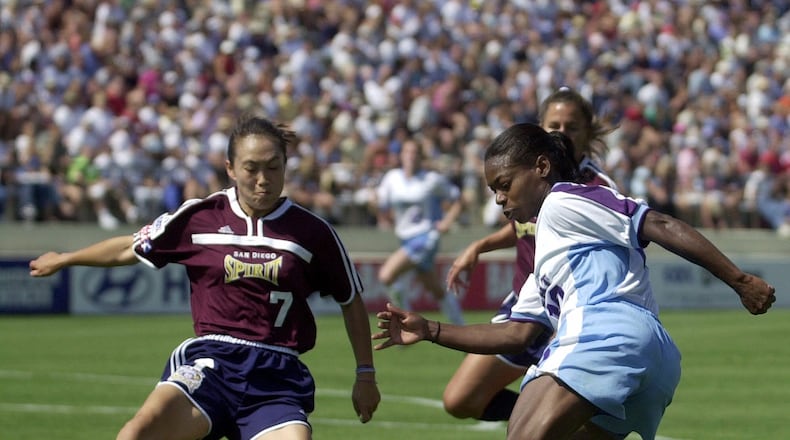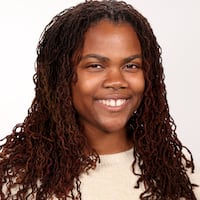It was a beautiful day for soccer in Atlanta.
The sun was out with temperatures in the 70s on April 21, 2001, for the first Women’s United Soccer Association match in the city, a game between the Atlanta Beat and New York Power. More than 20,000 fans filled Bobby Dodd Stadium.
The WUSA was founded just a year earlier following the success of the 1999 Women’s World Cup. When the number of fans at Bobby Dodd Stadium surpassed 17,271 — the stadium’s soccer capacity — officials opened the upper level to accommodate the interest.
Former U.S. national team member Wendy Gebauer Palladino called the game, which aired on TNT, along with broadcaster JP Dellacamera. American soccer great Michelle Akers also joined the broadcast. The game ultimately ended in a draw.
“I was getting very nostalgic out there because it looked like the World Cup (in 1999),” New York Power goalkeeper Gao Hong told The Atlanta Journal-Constitution after the game. “The spectators were fantastic. The players played hard. I believe this is a good omen.”
The league eventually folded in 2003. However, the match 19 years ago was an important moment in women’s soccer history. It created opportunities for soccer players, local and international, to become professional athletes in the United States. The Beat, who were owned by Cox Enterprises, played in the 2001 and 2003 WUSA championship games.
“Atlanta was very, very good to me,” said former Beat and U.S. national team goalkeeper Briana Scurry told the AJC recently. “I have incredibly fond memories of living there. It probably helped that that team was really, really good. We beat the heck out of everybody. Of course, you know, when you're winning, it makes your memory better.”
***
The Beat roster was full of stars.
From the U.S. national team, the Beat had Olympic gold medalists and World Cup champions in Scurry and Cindy Parlow Cone, who is now president of the U.S. Soccer Federation, and Olympic silver medalist Nikki Serlenga in the midfield.
The team’s internationals included Homare Sawa, Japanese national-team captain and eventual world champion, Canadian Charmaine Hooper and Chinese star forward Sun Wen, who was co-FIFA Female Player of the Century and the No. 1 overall pick in the inaugural WUSA draft.
The team even had a set of local twins, defenders Julie Augustyniak Tuff and Nancy Augustyniak Goffi of Peachtree City.
“Pre-having children, like child delivery, the hardest, most challenging thing that I've ever done in my life,” Julie said of playing with the Beat. “It tested me in a way like mentally, physically, emotionally, like every single day.”
Julie and Nancy played at Clemson from 1997-2000, and for the Beat played at left back and center back, respectively, in front of Scurry — someone Julie said they watched play while growing up.
The two look back on their Beat days often. They survived playing with and against some of the best soccer players in the world, while managing the reality of possibly being traded or cut at any moment.
Tom Stone, a longtime national-team scout and current women’s soccer coach at Texas Tech, led the Beat from 2001-03.
“He’s a very intelligent man and really good at his job,” Augustyniak Tuff said of Stone. “So I think the level that he could coach at, like how demanding he was, how smart, like the way he put practices together. Everything was very organized, everything had a purpose.”
The Beat meant something different to each player. But for Scurry, Atlanta was where she became an adult and grew as a soccer player. For the Augustyniak twins, it was a chance to live out their dreams at home.
Scurry lived in a condo near Piedmont Park with her dogs, a female yellow lab and a chocolate male. She played the game she loved for a living, instead of being uprooted for tournaments at a time.
After the breakout year in 1999, Scurry said she started “drinking her own kool-aid,” which led to the loss of her starting position with the national team for the 2000 Olympics. Atlanta is where she started improving her fitness, nutrition and personal development.
“I actually personally was going through a real time of growth in my perspective about, you know, who I wanted to become as a soccer athlete,” Scurry said. “During that time is when I was going through transformation of wanting to be the best Briana Scurry I could be versus just being better than the next person, you know, behind me. And Atlanta, really, I’ve attached the two together.”
While in Atlanta, she went from being benched on the national team to WUSA Goalkeeper of the Year in 2003.
The Augustyniaks had just finished their senior season at Clemson, where they’d gone to their second consecutive NCAA Elite Eight, when they were drafted into the league in 2000. Nancy was drafted first, at No. 33 in the fifth round, and while she was excited, she also was worried that this would be the first time she and Julie would play apart. Then, the Beat picked Julie at No. 64 in the eighth round.
When their coach at Clemson, Ray Leone, told Julie that a league was starting in the U.S., she brushed it off. The plan was to continue playing soccer, but she thought she would have to do it in Europe.
“It just didn’t cross my mind that I could make a living playing soccer,” she said. “I didn’t believe it, and then when it happened, I don’t even know if I can put it into words what that was like. And not only did we both get drafted, but we both got drafted to the same team in our hometown.”
Getting a red card for taking out Abby Wambach is something Nancy still recalls not so fondly, but she also remembers playing in the WUSA championship in 2001. The Beat played the Bay Area CyberRays in Foxborough, Mass., and lost in penalty kicks. Nancy called it an out-of-body experience.
“And I remember I was just like playing on fire,” Nancy said. “I mean, that’s like the culmination of my soccer career, you know, like getting to the championship and getting all the way down to the last second and then going into PKs. And unfortunately it didn’t go our way, but what an experience. I’ll never forget it.”
Credit: MARLENE KARAS
Credit: MARLENE KARAS
But after their third season and second championship appearance, they found out the league folded. The news came just days before the start of the 2003 World Cup, which was being held in the U.S. instead of China because of the SARS epidemic. When suspending operations, the league front office cited insufficient funds. Scurry was at a national-team training camp when she heard the news. She said she knew the league was in trouble, but didn’t know how bad. And then the end came quickly.
“We are in between a World Cup and an Olympic year. And that turnover is really swift,” Scurry said. “And I was really loving my time in Atlanta and all of the sudden the league just like, closed the doors. So now everybody thinks they have to decide, ‘Am I gonna live here or am I gonna go someplace else?’ It's a miracle that we handled it as well as we did, considering it was so disruptive.”
The folding didn’t surprise either of the twins. The league had conversations with the players about cutting things back after “they rolled out the red carpet,” the first season, according to Nancy. Julie, a saver by nature, thinks she saved $700 from the per diem in 2001.
“We lived large that first year,” she said. “We spent a lot of money. I felt like a very important person. Preseason we’re staying in Westin, with the heavenly beds? What?”
When the league folded, Scurry went on to play in more Olympic games and World Cups. The twins went overseas to play in Sweden and Germany, but they also were hoping another league in the states would start. Once stateside again, Julie played for F.C. Indiana and the Atlanta Silverbacks women’s developmental team. When she started teaching, she’d train and do sprints on the football field or lift weights between classes.
Eventually a league did start up — Women’s Professional Soccer held its draft in 2008. The Atlanta Beat were part of the league.
Julie put her name in the draft at the last minute but wasn’t picked.
Nancy was.
After the WUSA, Nancy coached at Arizona State and would get occasional calls up to the national team. She also took an insurance job. But by the time she moved to Raleigh, North Carolina, she’d gotten married and moved on from playing. Then, someone contacted her the day before the WPS draft and told her to put her name in. She did, and the Boston Breakers picked her. She played in 11 WPS games in 2009 before retiring.
She said it was tough. Her college coaches were nearby at Harvard, but her husband and twin were not. Plus, she’d been dealing with injuries.
“I was 30, I think I realized my body is done. I was done,” she said. “I regret how it went. But I would think I would have regretted it more if I hadn’t given it a shot. And literally, I think I had my first daughter that next year. So, it kind of gave me closure.”
The WPS folded in 2012, just months after Fayetteville native Kelly O’Hara, a two-time World Cup champion, signed with the WPS’ Atlanta Beat. During its second iteration, the team featured players such as Hope Solo, Carli Lloyd and Eniola Aluko.
Now, players from metro Atlanta such as O'Hara, Jane Campbell, Emily Sonnett, and Gabby Seiler, are playing in the National Women's Soccer League, which, before the coronavirus pandemic, was set to start its eighth season April 17.
Atlanta has been discussed as a potential city for NWSL expansion over the last year, because of the success of Atlanta United and the growth of the sport.
But women’s professional soccer in the city began on that sunny day in 2001.
“A lot of little kids now see they have a dream they can reach,” Parlow Cone said after that debut Beat match. “And that’s to play professional soccer.”
About the Author
Keep Reading
The Latest
Featured




